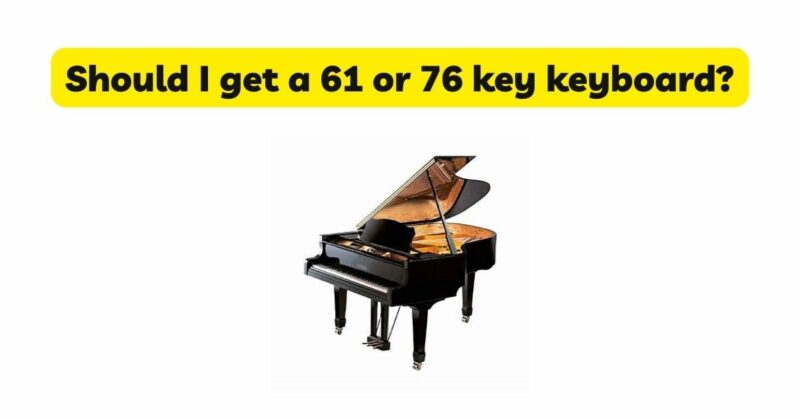When venturing into the world of keyboards, one common dilemma is deciding between a 61-key and a 76-key instrument. The number of keys on a keyboard impacts its versatility, playability, and suitability for various musical styles. This article aims to provide guidance to help you determine whether a 61-key or a 76-key keyboard is the right choice for your musical needs. By exploring factors such as musical aspirations, playing preferences, and the genres you wish to explore, you can make an informed decision.
Understanding the Difference:
- 61-key Keyboards: A 61-key keyboard is compact and portable, making it suitable for musicians who prioritize mobility. It spans five octaves and typically does not include weighted or graded keys. 61-key keyboards are commonly used for genres such as pop, electronic, and rock, where a wide range of sounds and effects are essential. They are also suitable for beginners or those with limited space or budget constraints.
- 76-key Keyboards: A 76-key keyboard extends over six octaves, providing an additional octave compared to a 61-key instrument. These keyboards often include weighted or semi-weighted keys, simulating the touch and feel of an acoustic piano. 76-key keyboards offer more versatility, allowing for a broader range of playing styles and accommodating genres such as classical, jazz, and contemporary music.
Factors to Consider:
- Musical Aspirations and Genres: Consider your musical aspirations and the genres you intend to explore. If you primarily focus on genres like pop, rock, or electronic music, a 61-key keyboard may suffice. These genres often require a wide range of sounds, beats, and effects, which can be achieved with the available keys. However, if you have a broader musical interest that includes classical, jazz, or piano-based compositions, a 76-key keyboard offers greater flexibility and a closer approximation to the range of an acoustic piano.
- Playing Preferences and Technique: Your playing preferences and technique also play a role in determining the suitable keyboard size. If you plan to perform more complex pieces that require a wider range of octaves or frequently use both hands in a split keyboard setup, a 76-key instrument may be preferable. The additional keys allow for more intricate arrangements and provide a better representation of the original compositions. Additionally, if you have experience playing an acoustic piano, the weighted keys on a 76-key keyboard can provide a more familiar and responsive touch.
- Portability and Space: Consider the portability and space available to you. If you frequently need to transport your keyboard or have limited space in your practice area, a 61-key instrument may be more practical. The compact size and lighter weight make it easier to carry and store. However, if portability is less of a concern and you have sufficient space for a larger keyboard, a 76-key instrument can provide a more comprehensive playing experience and greater versatility.
- Budget Considerations: Budget is an important factor to consider when deciding between a 61-key and a 76-key keyboard. Generally, 61-key keyboards tend to be more affordable, making them an attractive option for beginners or those on a tight budget. However, as the number of keys increases, the price of the keyboard may also rise. It’s important to find a balance between your budget and the features and functionality you require.
- Future Growth and Development: Think about your future growth and development as a musician. If you anticipate progressing and expanding your skills over time, investing in a 76-key keyboard may be a wise decision. It provides more room for musical exploration and allows you to grow into more complex compositions and playing styles. Conversely, if you have specific musical goals that align with a 61-key keyboard, there is no need to invest in additional keys that may not be utilized to their fullest potential.
Conclusion:
Choosing between a 61-key and a 76-key keyboard depends on several factors, including your musical aspirations, playing preferences, genres of interest, portability needs, available space, budget considerations, and future growth as a musician. A 61-key keyboard offers portability and versatility for genres like pop and electronic music, while a 76-key instrument provides greater range and a more authentic piano-like playing experience suitable for a wider variety of genres. Ultimately, the decision should be based on your personal needs and musical goals. By carefully considering these factors, you can select the keyboard that best aligns with your aspirations and supports your musical journey.


